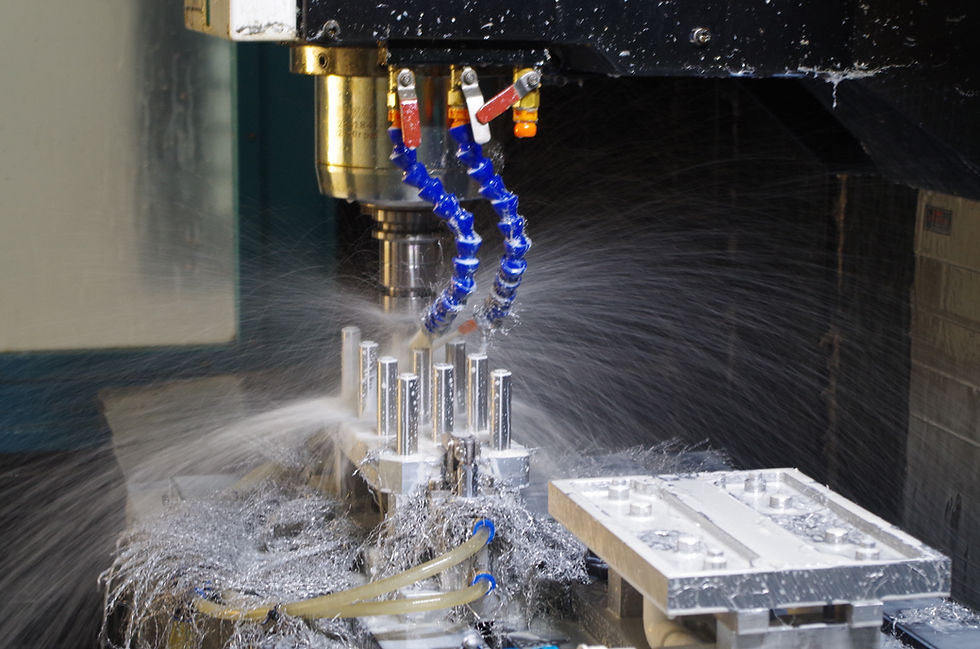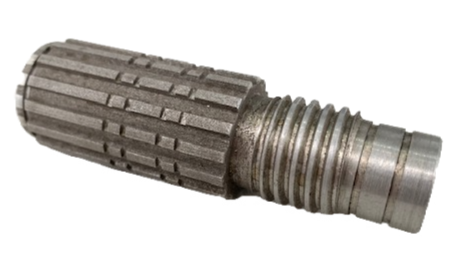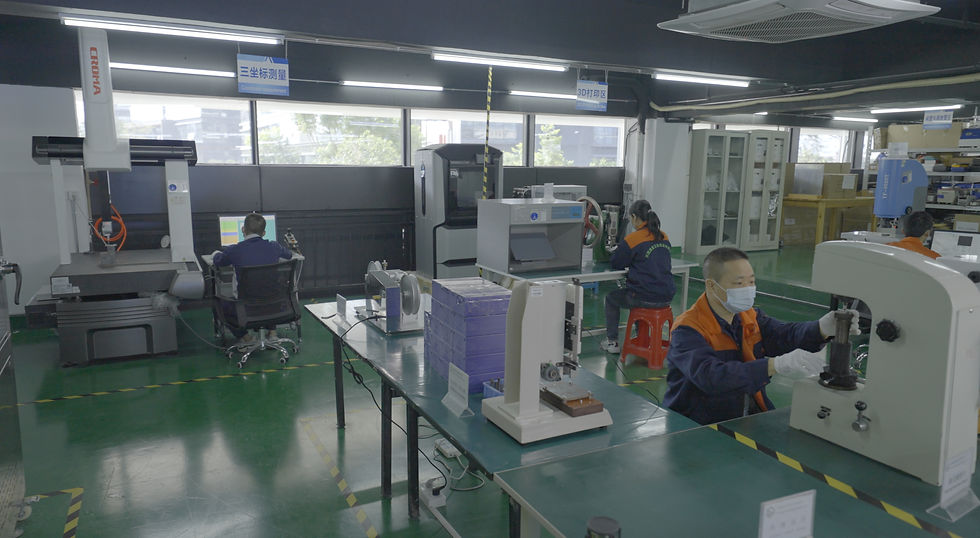Best CNC supplier for your product
- Jared Haw
- Aug 14, 2025
- 8 min read

Choosing the best CNC supplier for your product is more than just finding a company that owns the right machines. The right production partner can directly influence the quality of your parts, your production timelines, and your overall project costs. A strong sourcing process begins with clearly defining your requirements, understanding what materials you need, the tolerances your design demands, the complexity of the part, and your expected production volume.
From there, evaluating suppliers involves looking beyond capability alone to factors like location, lead time, and communication. By taking a structured approach, you can ensure that your CNC supplier is not only able to meet your technical needs but is also a reliable partner in bringing your product to market efficiently.
Define Your Product Requirements
Before you start contacting suppliers, you need a clear understanding of exactly what you require. This step is essential because the more specific and accurate your information, the more precise and competitive the supplier’s quote will be.
Material Selection
Material selection is one of the first decisions. Whether your design calls for aluminum, stainless steel, titanium, or engineering plastics, you should work with a supplier experienced in machining those specific materials. Different materials behave differently during the machining process, affecting cutting speeds, tool wear, and achievable tolerances.
Tolerances
If your part requires high-precision tolerances, especially in the micrometer range, ensure the supplier has the metrology equipment, such as coordinate measuring machines (CMMs), and the expertise to consistently meet them.
Part Complexity
A simple two-axis part might be within the capabilities of many suppliers, but multi-axis machining, intricate internal geometries, or special features like threading and knurling may require advanced CNC capabilities.
Production Volume
Production volume will influence not only supplier selection but also pricing and lead times. Some CNC shops specialize in prototypes or small batches, while others are set up for high-volume production. Clarify your initial volume and potential future demand so the supplier can plan accordingly.
Finishing
Lastly, consider surface finish and cosmetic requirements. If your product will be customer-facing, achieving a specific appearance, such as an anodized finish, polished surface, or tight visual uniformity, should be factored into supplier capability checks.
By defining these requirements in detail, you can narrow your supplier search to those who are truly equipped to deliver exactly what you need, setting the stage for a smoother and more predictable production process.

Research Potential Suppliers
Once you have a clear set of requirements, the next step is to identify suppliers who can meet them. Start by exploring industry directories, attending trade shows, and asking for referrals. These channels often reveal reputable CNC shops that may not appear in a basic online search.
When using online searches, be cautious and strategic. Include both your part type and location in your queries, for example, “best CNC supplier for your product in Thailand” or “multi-axis CNC machining for stainless steel in the USA.” This approach will help you find suppliers with relevant capabilities and experience in your preferred manufacturing region.
Take time to review each supplier’s portfolio and case studies. Look for projects similar to yours in terms of material, tolerances, and complexity. A supplier that has already produced similar parts will be better equipped to anticipate challenges and maintain consistent quality.
If possible, ask for customer references or testimonials. Hearing directly from other companies about their experience with lead times, quality, and communication can provide insight that technical specifications alone cannot.
Finally, don’t overlook certifications and compliance. Suppliers holding ISO 9001, AS9100, or other industry-specific certifications have demonstrated a commitment to quality management systems, an important factor when evaluating their reliability.
A thorough supplier search at this stage will give you a shortlist of candidates who are technically capable, experienced in your type of product, and aligned with your geographic and logistical needs.

Evaluate Supplier Location
Where your CNC supplier is located can significantly influence your project’s cost, lead time, and overall efficiency. A domestic supplier offers advantages like lower shipping costs, easier communication during working hours, and no tariffs (at least on the finished good). However, local options may come with higher labor and operational costs.
Overseas suppliers, on the other hand, may offer more competitive pricing, but longer shipping times and additional import/export processes must be factored in. When you are taking into account your landed costs, make sure you add up all of the extra fees that go along with shipping, tariffs, etc.
The supplier’s location also affects their ability to support your production schedule. If you need frequent prototype iterations, a nearby supplier can speed up the feedback loop. For long-term production, the added transit time from an overseas supplier may be acceptable if the cost savings and capabilities outweigh the delay.
Another consideration is the proximity to your end market. If your customers are concentrated in a specific region, producing closer to them can reduce delivery times and logistics costs while providing a marketing advantage as “locally made.”
By weighing these location-based factors against your budget and timeline, you can determine whether the best CNC supplier for your product is down the road or across the globe.

Assess Lead Time & Capacity
Even the most technically capable supplier won’t be the best fit if they can’t deliver parts when you need them. Lead time is a critical factor, particularly if your project has tight deadlines or if you’re operating on a just-in-time production model.
When evaluating potential CNC suppliers, ask for realistic delivery estimates based on your specific requirements, material type, complexity, and volume, all influence turnaround times. Be cautious of promises that seem overly optimistic, as rushing production can lead to quality issues.
It’s equally important to understand a supplier’s production capacity. A shop that is already operating at maximum workload may struggle to accommodate urgent orders or scale up when your volume increases. Discuss their current workload, equipment availability, and shift schedules to determine if they can reliably handle both your immediate and future needs.
Some suppliers may offer flexible scheduling or keep extra capacity open for priority customers. If your product requires frequent reorder cycles or rapid prototyping, these capabilities can be a major advantage.
Ultimately, the best CNC supplier for your product is one that can meet your lead time requirements without sacrificing precision, quality, or consistency.
Communication & Project Management
Strong communication is one of the most underestimated factors in selecting the best CNC supplier for your product. Even a highly skilled manufacturer can cause delays and cost overruns if they are slow to respond or unclear in their updates.
Look for suppliers who respond promptly to inquiries and provide detailed answers rather than vague confirmations. A supplier who asks clarifying questions about your drawings, tolerances, or materials is more likely to understand your requirements and deliver accurately.
Assess how they handle the RFQ (Request for Quotation) process. A well-prepared quote that includes pricing, lead times, and any suggested design adjustments shows attention to detail and a commitment to transparency.
Project management capability is equally important. Some CNC suppliers have dedicated account managers or project coordinators to track your orders from start to finish, while others rely solely on production staff for updates. Dedicated coordination often leads to fewer miscommunications and smoother scheduling.
If sourcing overseas, factor in language and cultural differences. Working with suppliers who have bilingual staff or a proven history of dealing with international clients can help prevent misunderstandings that might otherwise impact quality or timelines.
Ultimately, a supplier’s ability to maintain clear, consistent communication throughout the project builds trust and reduces the risk of costly mistakes.

Quality Control & Inspection Processes
No matter how advanced the CNC machines or how skilled the operators, consistent quality doesn’t happen without strong quality control systems in place. When sourcing the best CNC supplier for your product, you should verify how they ensure every part meets your specifications before it reaches you.
Start by asking about their inspection equipment. For precision parts, tools like Coordinate Measuring Machines (CMMs), optical comparators, and surface finish testers are essential for verifying tolerances. If your parts require tight dimensional accuracy, these capabilities should be non-negotiable.
Review their quality documentation process. This may include First Article Inspection (FAI) reports, material certifications, and process control records. Suppliers who provide detailed documentation demonstrate both transparency and accountability.
It’s also important to understand their in-process inspection approach. Relying solely on final inspections can allow defects to accumulate; a supplier that checks parts during each stage of production is more likely to detect and resolve issues early.
If possible, request sample parts or a trial run before committing to large-scale production. This gives you an opportunity to assess quality firsthand and verify that the supplier’s output matches your drawings and expectations.
By selecting a CNC supplier with robust quality assurance processes, you reduce the risk of rework, delays, and customer dissatisfaction, protecting both your project and your reputation.
Pricing & Contract Terms
While price is always an important consideration, it should never be the sole deciding factor when choosing the best CNC supplier for your product. A low quote may seem attractive at first, but if it comes at the expense of quality, consistency, or lead time, it can cost far more in the long run.
When reviewing quotes, compare them against the supplier’s capabilities, quality control processes, and track record. Make sure the pricing is transparent, with clear details on material costs, machining labor, surface finishing, and any additional services such as inspection reports or packaging. Hidden charges for setup, tooling, or expedited orders can add up quickly if not clarified in advance.
It’s also essential to review the payment terms. Consider whether the supplier requires an upfront deposit, offers staged payments, or expects full payment before shipment. Clear terms help avoid misunderstandings and improve cash flow planning.
In addition, review contractual details such as warranties, revision policies, and intellectual property protections. A well-written agreement should cover what happens if parts fail to meet specifications, how design changes will be handled, and how your proprietary information will be safeguarded.
A competitive price combined with fair, transparent terms is a strong indicator that you’ve found a supplier who values a long-term partnership over short-term profit.
Build a Long-Term Supplier Relationship
Finding the best CNC supplier for your product is just the first step; maintaining that relationship is what delivers ongoing benefits. A supplier who understands your business, your quality expectations, and your preferred communication style will often work more proactively to meet your needs.
Consistency in working together can lead to process improvements over time. As the supplier becomes more familiar with your parts, they may suggest design adjustments that reduce machining time, improve tolerances, or lower costs. This level of collaboration is much harder to achieve if you are constantly changing suppliers.
Long-term partnerships can also help with priority scheduling. When capacity is tight, a supplier is more likely to reserve production slots for established customers. They may also extend better payment terms, share market insights, or invest in new capabilities to support your projects.
Building a strong supplier relationship requires mutual trust, clear communication, and a willingness to address challenges openly. By treating your CNC supplier as a strategic partner rather than just a vendor, you position your business for smoother production, fewer disruptions, and better results over the life of your product.
Conclusion: Choosing the Best CNC Supplier for your Product
Sourcing the best CNC supplier for your product is a process that requires careful planning, clear communication, and thorough evaluation. By starting with well-defined requirements, covering materials, tolerances, complexity, and volume, you give suppliers the information they need to provide accurate and realistic proposals. From there, factors like location, lead time, quality assurance, and contract terms help you determine which supplier is the best overall fit.
While pricing will always play a role, the true value lies in a supplier’s ability to deliver consistent quality, meet deadlines, and support your long-term production goals. Building a strong working relationship ensures that your supplier becomes a trusted partner, capable of adapting as your business grows and your products evolve.
In the end, the best CNC supplier for your product is the one that aligns technical expertise, operational reliability, and collaborative support to help you bring your designs to life, on time and to specification.




Comments